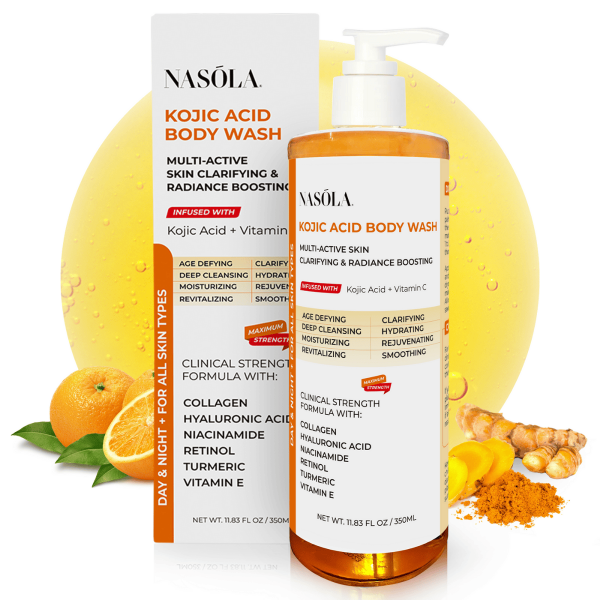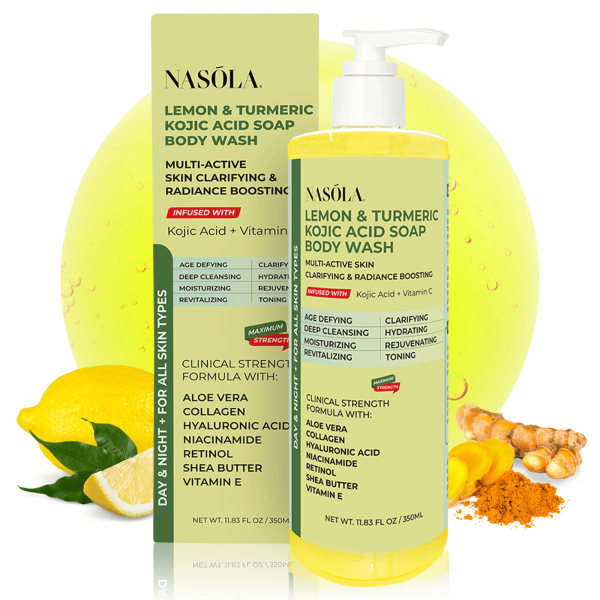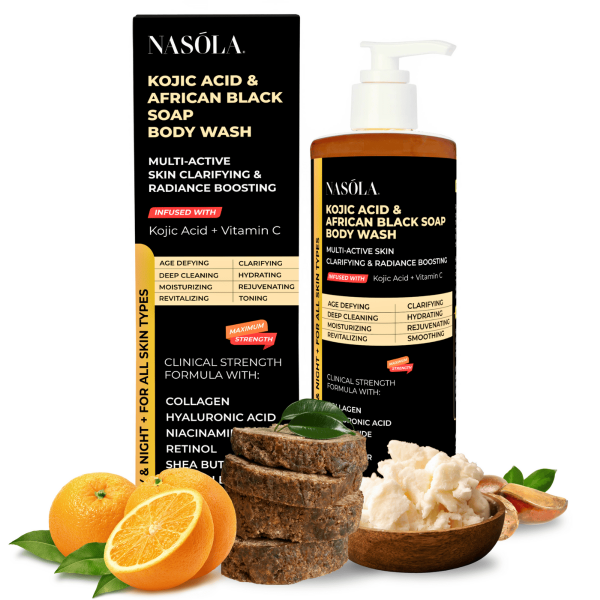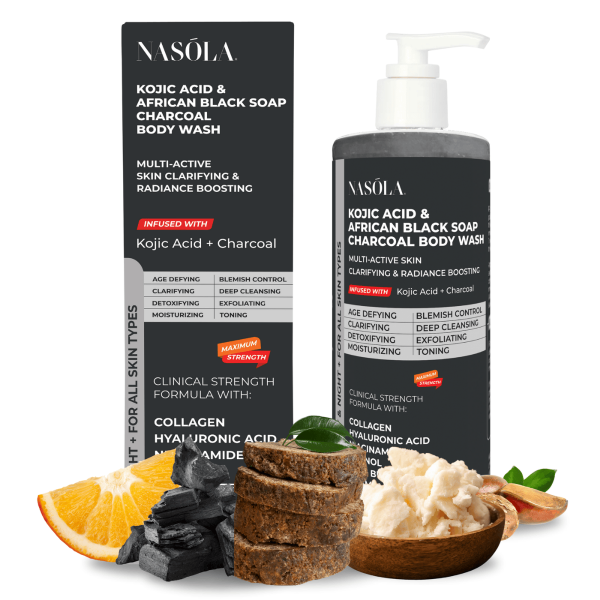Moroccan black soap has been a beauty ritual long before glass skincare shelves and 10-step regimens.
We’re talking centuries of tradition, passed down from Moroccan hammams to modern bathrooms around the world.
Why? Because this stuff works — no fluff, no hype, just pure, plant-based brilliance.
If your skin’s been feeling dull, uneven, or just… blah?
There’s a reason Moroccan black soap is still alive and well — it detoxifies, deeply cleanses, soothes like a spa day, and smooths out your skin texture.
And when paired with modern powerhouses like kojic acid and turmeric, you get a glow-up that’s both ancient and elevated 🔥.
In today’s lineup, we’re blending tradition with innovation using gems like Nasola Kojic Acid Body Wash, Nasola Lemon Turmeric Kojic Soap Body Wash, Nasola Kojic Acid African Black Soap Body Wash, and Nasola Kojic Acid African Black Soap Charcoal Body Wash.
Let’s get into that glow…
- Moroccan Black Soap and Its Skincare Legacy
- Understanding Moroccan Black Soap Benefits
- How to Use Moroccan Black Soap for Maximum Results
- Upgrading Your Routine with Nasola's Kojic Acid-Infused Black Soap Collection
- Moroccan Black Soap vs African Black Soap: What’s the Difference?
- Conclusion
- Frequently Asked Questions About Moroccan Black Soap
Moroccan Black Soap and Its Skincare Legacy
When we talk about skincare with roots, Moroccan black soap deserves the throne. It’s not just a cultural recipe — it’s centuries of skin wisdom wrapped into a velvety dark paste.
Originating in Moroccan hammams (steam baths), this plant-based product is made from crushed olives, olive oil, and sometimes infused with eucalyptus for an added herbal kick. 🫒🌿
What makes it stand out from traditional soaps?
It doesn’t lather like your usual body wash — instead, it glides onto damp skin, melts down grime, and prepares it for exfoliation. Think of it as your skin’s reset button.
This paste-like texture clings to your skin long enough to gently loosen dead skin buildup while remaining incredibly rich in antioxidants.
And those old-school, overly drying bars you may be used to?
They don’t stand a chance…
What is Moroccan Black Soap?
Moroccan black soap, also called savon beldi, is an original product of North African heritage. Produced mainly in Morocco, this luxe skin treat is not only natural — it’s biodegradable and cruelty-free.
It’s crafted from two simple things:
- Saponified olive oil (yes, your pantry favorite!)
- Crushed olives and black olive paste
Some variants also include eucalyptus oil or essential oils for fragrance and added skin-calming effects.
What’s unique about Moroccan black soap?
- It’s a paste, not a bar
- Applied on damp skin and left to penetrate for 5–10 minutes
- Typically used with a kessa (scrubbing glove) to exfoliate dead skin cells
This soap has stood the test of time not just for its simplicity, but its efficacy. It detoxifies, hydrates, and preps the skin for better absorption of oils and serums afterward.
And guess what?
It doesn’t strip your skin like detergent-packed bars or chemical exfoliants. Instead, it works harmoniously with your natural oils.
Comparing with Traditional Soaps
Now let’s be real — not all soaps are created equal.
Your standard bar soaps may:
- Contain synthetic surfactants that mess with your pH
- Leave skin dry, flaky, and tight
- Strip essential oils, making skin overproduce sebum
Meanwhile, Moroccan black soap:
- Maintains natural skin moisture
- Gently exfoliates without microtears
- Has a mildly alkaline pH closer to what your skin can tolerate
- Acts as a natural antibacterial base — AMAZING for blemish control!
Let’s put it this way:
Using traditional soap is like mowing grass with a chainsaw.
Using Moroccan black soap? It’s more like pruning roses with satin gloves. 🌹
Understanding Moroccan Black Soap Benefits
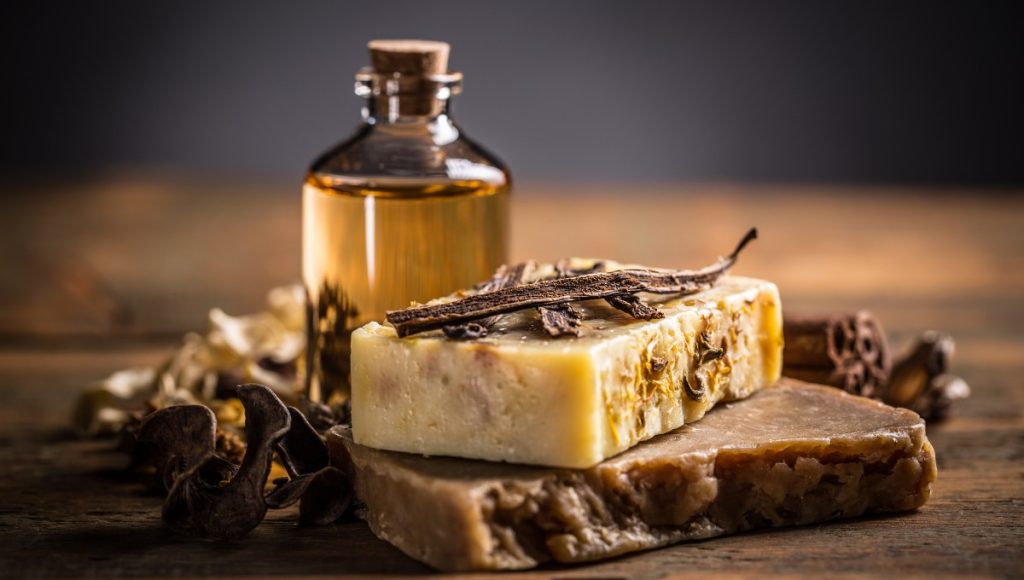
Let’s talk about real, tangible Moroccan black soap benefits. From detox to anti-aging, its power lies in how it zeroes in on what your skin needs and helps peel away what it doesn’t.
If your skin is going through it — like clogged pores, signs of stress, or just general dullness — this is the moment to discover what this soap can really do.
Ready?
Let’s go benefit-by-benefit.
Deep Cleansing & Detoxification
One of the strongest Moroccan black soap benefits is its detoxifying power. It’s like a facial — but for your entire body. Its olive-based paste clings gently to the skin, dissolving impurities, product build-up, and excess oil like butter under steam.
Best part?
It helps regulate oil without over-drying.
Pairing this ritual with something just as potent — like the Nasola Kojic Acid African Black Soap Charcoal Body Wash — takes things to another level.
This wash combines the detox benefits of activated charcoal and the brightening effects of kojic acid, making it perfect for those fighting acne or dull, rough patches.
Here’s what you gain:
- Unclogged pores (say goodbye to bacne!)
- Gentle exfoliation and clearer tone
- Fewer flare-ups thanks to deep bacteria removal
- Healthy glow without stripping moisture
Exfoliating feels good when you see the grime go down the drain…
But knowing your skin is revealing its best side? Even better.
Anti-inflammatory and Antibacterial Properties
Dealing with irritated skin — redness, psoriasis patches, eczema flare-ups?
Moroccan black soap is full of antioxidant compounds that help reduce inflammation and improve circulation. It contains naturally antibacterial agents from olive and eucalyptus extracts, reducing bacteria buildup and calming stress-related breakouts.
Want to keep that effect going daily?
Try using the Nasola Kojic Acid Body Wash in between your exfoliation days. Packed with kojic acid, it calms irritation and brightens pigmented spots gently with every rinse.
Here’s what to expect:
- Reduced redness and dry flakes
- Calmer, more even skin tone
- Softer body appearance, even with sensitive areas
- Blemish control made gentle enough for daily use
For those managing chronic skin conditions, black soap plus soothing kojic support? It’s a skin-saving combo.
How to Use Moroccan Black Soap for Maximum Results
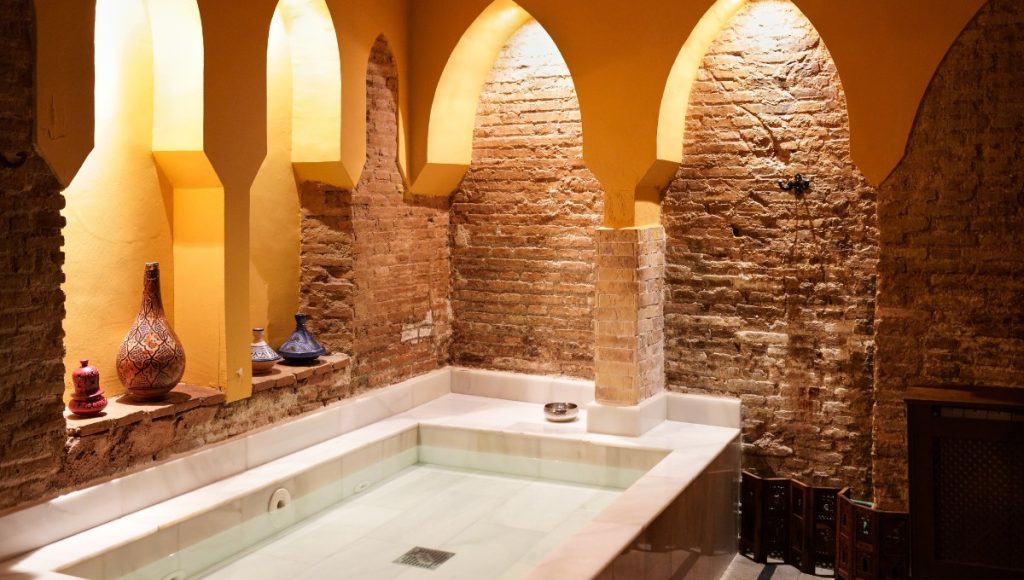
Understanding how to use Moroccan black soap effectively turns a regular shower into an at-home luxury ritual. It’s not about slathering and rinsing in 10 seconds — it’s about giving it time to work.
Here’s your step-by-step for glassy, super-smooth skin.
Weekly Exfoliation Ritual
This is the classic hammam-inspired method, and it’s game-changing.
Here’s what to do:
- Warm your bathroom or take a steamy shower first
- Apply Moroccan black soap to damp skin (skip face if you’re sensitive)
- Let it sit for 5 to 10 minutes while steam opens your pores
- Use a kessa glove to exfoliate in circular motions
- Rinse thoroughly and hydrate afterward
Why this works:
- It loosens up dead cells for an effortless scrub
- Leaves behind CLEAR, product-absorbing skin
- Regular use fades hyperpigmentation and texture issues
- Promotes lymphatic flow and improves circulation
Exfoliate once or twice a week MAX.
You want radiant, not raw.
Combine with Kojic Acid Skincare for Enhanced Glow
Your exfoliation doesn’t end with Moroccan black soap — pair it strategically for brightness and hyperpigmentation correction.
Enter: Nasola Lemon Turmeric Kojic Soap Body Wash 🍋
This wash combines kojic’s brightening power with turmeric’s anti-inflammatory and antioxidant properties. It helps:
- Fade dark spots faster post-exfoliation
- Deliver a beautiful post-scrub glow
- Continue lightening pigmentation throughout the week
- Smell fresh, citrusy, and herbaceous all at once
Use it every other day for luminous skin that looks AND feels nourished.
Upgrading Your Routine with Nasola’s Kojic Acid-Infused Black Soap Collection
When tradition meets modern formulation, you get something uniquely effective. Nasola’s kojic acid-infused black soap body washes offer a daily routine that carries Moroccan black soap’s legacy — but levels it up.
Let’s break down what each fusion brings to your routine.
Nasola Kojic Acid African Black Soap Body Wash
This formula blends rich African black soap with kojic acid. Already a spot-fading powerhouse, it works wonders on:
- Bacne and inflammatory acne
- Hyperpigmented elbows, knees, and inner thighs
- Rough skin texture along upper arms or thighs
- Uneven tone from overexposure or scarring
Use this for:
- Daily maintenance
- Targeted brightening
- Gentle antibacterial cleansing
➡ Grab it here
Detox and Rejuvenate with Charcoal + Kojic Fusion
Urban environments expose skin to pollution, refined air, and congested pores.
That’s why Nasola Kojic Acid African Black Soap Charcoal Body Wash is a must for city slickers.
What you get:
- Deep charcoal detox + oil balance
- Kojic brightening with activated clay benefits
- Enhanced glow control even during stressful skin months
- Luxurious lather without sulfates or dryness
Use it 3-4 times weekly to neutralize buildup before it becomes a breakout.
Moroccan Black Soap vs African Black Soap: What’s the Difference?

Let’s end the confusion. While they’re often categorized together, Moroccan black soap and African black soap are entirely different tribes in the same skincare family.
Let’s compare side-by-side.
Ingredient Origins and Texture
- Moroccan black soap: Olive paste and eucalyptus — think creamy gel.
- African black soap: Cocoa pod ash and plantain skin — solid bar texture.
Their textures alone speak volumes — one melts into skin while the other foams up fast.
Skin Type Suitability
- Moroccan: Ideal for dry, mature, and sensitive types
- African: Better suited for acne-prone, oily, and combination skin
Nasola fuses best of both: black soap with kojic acid extract.
Two solid choices:
- Nasola Kojic Acid African Black Soap Body Wash
- Nasola Kojic Acid African Black Soap Charcoal Body Wash
Get both and rotate for seasonal skin shifts.
Conclusion
Moroccan black soap is more than skincare. It’s a tradition, a ritual, and a science-backed glow generator.
Deep-cleansing? Check.
Gentle daily routine? Absolutely — with Nasola’s kojic acid-infused line. The combo of turmeric, charcoal, and kojic acid over time simply works. Texture improves. Spots fade. Confidence builds.
So, what now?
✨Elevate your routine. Introduce Moroccan black soap weekly.
✨Layer with Nasola’s targeted solutions daily.
✨Own your skin’s glow story naturally.
Give your skin that centuries-old respect — and the modern support it deserves 💛
Frequently Asked Questions About Moroccan Black Soap
Yes! Moroccan black soap is excellent for acne-prone skin due to its natural antibacterial and pore-unclogging properties. When combined with Nasola Kojic Acid Body Wash, it helps reduce active breakouts while fading acne scars over time.
While gentle, Moroccan black soap is best used 1–2 times a week. Overusing can lead to dryness or sensitivity, especially with its exfoliating effects. Pair with creamier daily options like Nasola’s kojic acid body washes for balance.
Follow up with a nourishing moisturizer or glow-enhancing soap like Nasola Lemon Turmeric Kojic Soap Body Wash to lock in hydration and brighten dull areas over time.
Moroccan soap is a paste made with olive oil for sensitive skin, while African black soap is a solid bar made from cocoa pods, great for oily or acne-prone skin. Nasola fuses pure African black soap with kojic acid for the best of both.
It removes odor-causing bacteria naturally. For enhanced freshness and detox, follow with Nasola Kojic Acid African Black Soap Charcoal Body Wash—especially after workouts or hot days.
Not by itself. However, it removes dead skin cells which brightens tone. If skin lightening is your goal, partner it with kojic acid products such as Nasola Kojic Acid African Black Soap Body Wash.
Yes! With regular use, it smooths bumpy skin by gently exfoliating and softening keratin buildup. For daily support, alternate with a gentle kojic body wash.
Absolutely. It helps remove dead skin layers that trap hairs underneath. Exfoliate gently once weekly using a kessa glove, then moisturize after.
Yes — use it cautiously the first time. Always test a small area and avoid harsh scrubbing. Its olive oil base makes it gentle, but irritation varies by skin.
Keep it in a cool, dry place away from sunlight to preserve freshness. It generally lasts up to 18 months. Avoid moisture in the jar to prevent contamination.


